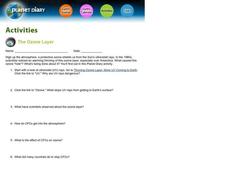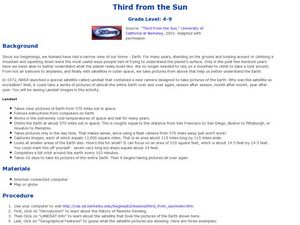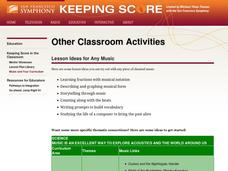Curated OER
Shoot for the Moon
Second graders distinguish the different phases of the moon. In this astronomy lesson, 2nd graders study the history of its discovery and myths about its origin. They simulate how the moon's surface is illuminated by the sun.
Curated OER
Global Warming Information at the Mount
In this online interactive science worksheet, students answer 4 science questions with multiple choice answers regarding global warming. Students fill in the answer online to one question about temperature.
Curated OER
The Ozone Layer
In this ozone activity students complete an interactive activity on the thinning of the ozone then answer a series of questions on the earths UV rays.
Curated OER
Navigation and Trajectory
Students prepare a creative demonstration of how Earth and Mars revolve around the Sun. In this astronomy lesson, students determine the different challenges engineers face when building spacecrafts. They draw possible paths for a...
Curated OER
The Magnetic Sun
Learners follow steps to build a simple version of a magnetometer, an instrument capable of detecting areas of strong magnetic field. Students use the magnetometer to investigate models of the Sun and examine images of the Sun.
Curated OER
Third from the Sun
Students examine images from space. In this third from the Sun lesson plan, students examine images from, Landsat, the satellite launched by NASA in 1972.
Curated OER
A Lunar Transit of the Sun from Space
In this moon worksheet, students determine the angular size of the moon and draw a scaled model of the Earth, moon, and sun and given distances and positions. This worksheet has 4 problems to solve.
Curated OER
The Planet Earth
Students explore the planet Earth, outer space, and Earth's axis. They demonstrate reading comprehension skills, including literal meaning, inference and critical analysis.
Curated OER
Science Word Search
In this science worksheet, students locate and identify various vocabulary terms related to earth science. There are 44 words/phrases located in the puzzle.
Curated OER
Exploring Earth Through Maps and Technology
In this maps worksheet, students read 3 pages of detailed information about maps, latitude, longitude, topography, satellites and global positioning. Students then answer 10 questions. There is also a research project assignment available.
Illustrative Mathematics
Solar Eclipse
Learners take on the role of astronomers, calculating conditions necessary for a total solar eclipse. Concepts of similar triangles and properties of circles come together as pupils create ratios and use real measurements in determining...
Curated OER
It's Raining, It's Pouring: The Water Cycle
Students investigate the relationship of the steps in the water cycle, and create a simulation of the water cycle in a jar.
Columbus City Schools
Experiencing Eclipses
Don't be caught in the dark! Young scientists investigate the causes of both solar and lunar eclipses using an interactive to help them understand the development of an eclipse over time. They then research facts and characteristics...
California Academy of Science
Modeling Eclipses with Size and Distance Scales
Size within the solar system is a difficult thing for pupils to imagine. Using everyday objects, they build models to show the scale between the sun, moon, and Earth. They situate their props in proportional distances between the objects...
Curated OER
Winter Season
Students recognize the relationship between Earth's tilt and the Winter season. In this Winter lesson, students work in pairs to complete make frost and design snow goggles. Students experiment a hand lens to study the frost created....
Curated OER
Comparison Activities
Students explore the size of the sun and it's temperature. Using the Internet, students visit given websites to compare the sun's diameter, outer layers, and mass to visual items students can relate to. They also compare the sun's...
Curated OER
Using a Sundial
Students examine the use of a sundial to tell apparent time. For this sundial lesson, students watch a teacher demonstration using a flashlight to create shadows. They discuss what happens to shadows of different objects as the position...
Curated OER
Stormy Sunspots
In this sunspots worksheet, students determine how magnetic storms on Earth are related to sunspot activity. They plot data for sunspot activity between 1967 and 1997. They compare their plotted data with the data for magnetic storms on...
Curated OER
Lunar Learning
Learners learn about the phases of the moon. In this moon phases lesson, students learn about what causes the moon to look different to us everyday and how the Earth and Sun's position determine what phase the moon is in.
San Francisco Symphony
Lesson Ideas for Any Music
Music is a wonderful tool you can add to enhance the learning process for every subject. Here is a list of music selections that are categorized by subject, along with some neat teaching suggestions. You'll find songs suited to...
Curated OER
Earth
First graders define what a planet is and study the planet earth. They examine the effects of the sun on the earth and make a model.
Curated OER
Earth and Seasons
Sixth graders comprehend that the path Earth takes as it revolves around the sun is called its orbit. They also comprehend that the axis is an imaginary line that passes through Earth's center and its North and South Poles. Students...
Curated OER
How Can a Spacecraft Always Face the Sun?
Students determine the correct orbital path for a satellite that collects data about the sun so that its view of the sun never be obstructed by the Earth.
Curated OER
Orientation of the Earth in Space
Students hypothesize the location of the sun in the sky at diferent times of day and at different latitudes. They perform several experiments to provide evidence for their hypothesis. Experiments including observing the sun's position at...

























